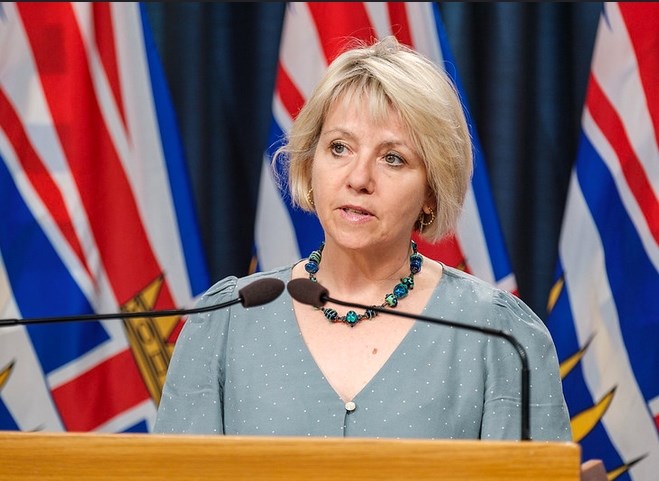
Provincial health officer Dr. Bonnie Henry
Image Credit: Flickr/Government of B.C.
August 24, 2022 - 4:30 PM
Just when many B.C. residents thought they had put COVID-19 behind them, provincial health authorities are gearing up for the next round of booster shots.
“I suspect we’re going to see more influenza in the fall, just looking at what happened in Australia and New Zealand,” provincial health officer Dr. Bonnie Henry told iNFOnews.ca. “It will probably be a little bit earlier and we’re going to see COVID surge again – possibly a new strain of Omicron – and we’re going to see a decreasing of immunity both in people who had infections and people who have been vaccinated.”
Up until now, only people over the age of 70 or who are “critically extremely vulnerable” have been able to get a fourth dose of COVID vaccines.
This fall, that’s going to open up to all B.C. residents over the age of 12 who have already received three doses.
The older and critically extremely vulnerable groups can look forward to getting a fifth dose around October.
Those vaccinations will start to roll out after a new Moderna bivalent vaccine arrives in early September. It targets both the original strain of COVID and the more easily transmitted Omicron variant.
“At this point, I think it’s best for us to wait to have bivalent booster doses then focus on giving people the best protection going into November and December because we know, when you get the booster dose, it gives you really good protection against infection, not 100% but 60-70% protection,” Dr. Henry said. “But that decreases over time.”
This is coming after Quebec announced it is rolling out fifth doses for long term care residents and cases are occurring at much higher rates there, in Ontario and some Maritime provinces.
READ MORE: Quebec starts offering fifth dose of COVID-19 vaccine to long-term care residents
In the two weeks period up to Aug. 13, B.C. recorded 34 cases per 100,000 population while Ontario was at 142 per 100,000 and Quebec at 178.
While B.C. health officials put B.C.’s lower numbers down to higher vaccination rates, that’s really not the case.
In B.C., 83.7% of residents had received two vaccine doses as of Aug. 14. That compares to 83.2% in Quebec and 81.9% in Ontario.
Dr. Henry could not give a clear explanation as to why there are such differences in case rates, given that each province uses basically the same reporting methods.
“It’s hard to say,” she said. “They may have more transmission in certain areas. We’ve seen it as well in pockets where vaccination is lower.”
The provincial figures are global and don’t show vaccinations by area or age.
One thing B.C. did differently than any other province was identify people with compromised immune systems and put them near the top of the list for getting vaccinations.
“We have really high immunization rates in people over 70,” Dr. Henry said. “So that 50% (vaccination rate for people with three doses) is 90% in people over age 70 and lesser in younger people. The focus really was, for that spring booster – that fourth dose – was really for people where we were starting to see breakthrough infections that were leading to severe illness and hospitalization.”
Only 7.6% of B.C. residents have received a fourth dose.
Dr. Henry also urged parents with children five to 11 years old to get vaccinated heading back into the school season. Only 50% of those children are vaccinated.
There are also vaccines available for children under the age of five.
Nationally, Nova Scotia and Prince Edward Island have the highest per capita case rates of any provinces, even though they have higher vaccination rates.
Nova Scotia had 328 cases per 100,000 with a two-dose vaccination rate of 86.5% (compared to 83.7% in B.C.).
Prince Edward Island had a staggering 935 cases per 100,000 despite having 88% of residents receiving two doses.
So, when, if ever, is this pandemic going to end?
“I think we are emerging,” Dr. Henry said. “It’s not over yet. Maybe it’s my optimism but I think we need to get through this respiratory season and watch what happens and we’ll gradually emerge from this pandemic.”
She expects it to take another six months before the pandemic is declared over.
“COVID is going to be with us,” Dr. Henry said. “It’s going to be part of how we need to deal with respiratory illness. With another season under our belt, we’ll have a much better idea of how long the vaccines are lasting, the level of immunity you get longer term and the evolution of the virus around the world.”
People can register at GetVaccinatedBC and will be sent a booking registration link.
Those who are already registered will get a notification for another dose six months after their latest vaccination.
To contact a reporter for this story, email Rob Munro or call 250-808-0143 or email the editor. You can also submit photos, videos or news tips to the newsroom and be entered to win a monthly prize draw.
We welcome your comments and opinions on our stories but play nice. We won't censor or delete comments unless they contain off-topic statements or links, unnecessary vulgarity, false facts, spam or obviously fake profiles. If you have any concerns about what you see in comments, email the editor in the link above.
News from © iNFOnews, 2022